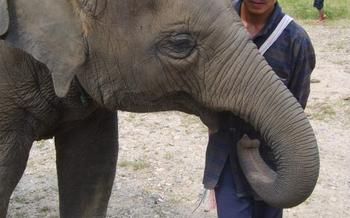
The Elephant Conservation Center's Elephant Show
- Elephant Conservation Center in Lampang, Thailand:
- Elephant Show at the Center: A Showcase of Intelligence and Grace
- Elephant Bathing and Feeding Sessions
- Elephant Trekking: Exploring Lampang's Landscapes on Elephant Back
- Elephant Hospital and Care Facilities
- Elephant Education and Research Center
- Cultural Performances and Handicrafts
- Elephant Sanctuary and Rescue Efforts
- Ecotourism and Sustainable Practices
- Mahouts and Their Role
- Elephant Conservation Challenges
- Volunteering and Contribution Opportunities
- Photography Tips for Capturing Elephant Moments
- Souvenir Shopping and Supporting Local Artisans
Elephant Conservation Center in Lampang, Thailand:
Established in 1993, the Elephant Conservation Center in Lampang, Thailand, stands as a beacon of hope for the preservation of these majestic creatures. Its mission revolves around rescuing, rehabilitating, and releasing captive elephants back into their natural habitats, while simultaneously fostering a deep understanding and appreciation for these gentle giants among visitors. The center's dedication to elephant conservation is evident in its comprehensive approach, encompassing educational programs, research initiatives, and community outreach activities, all geared towards ensuring a brighter future for Thailand's elephants.
The center's historical significance lies in its pioneering role in elephant conservation efforts within the country. It was one of the first institutions to recognize the urgent need to address the plight of captive elephants, particularly those used in the logging industry, and to provide them with a safe haven for recovery and rehabilitation. Over the years, the center has rescued and cared for hundreds of elephants, many of whom have been successfully reintegrated into their natural habitats.
Conservation efforts at the center are multifaceted, encompassing research, education, and community engagement. Research initiatives focus on elephant behavior, ecology, and conservation genetics, providing valuable insights into the species' needs and threats they face. Educational programs aim to raise awareness about the importance of elephant conservation and promote responsible interactions with these animals. Community outreach activities involve working closely with local communities to foster coexistence between humans and elephants, addressing issues such as human-elephant conflict and promoting sustainable practices.
Elephant Show at the Center: A Showcase of Intelligence and Grace
The elephant show at the Elephant Conservation Center in Lampang, Thailand, is a captivating display of elephant intelligence, skills, and abilities. These majestic creatures perform awe-inspiring feats that showcase their strength, agility, and problem-solving abilities. Visitors are treated to a unique spectacle as they witness elephants painting, playing musical instruments, balancing on platforms, and even playing soccer.
The elephant show highlights the remarkable cognitive abilities of elephants, demonstrating their ability to learn complex tasks and follow instructions. The elephants' precision and grace are a testament to the deep bond and understanding they share with their mahouts (elephant handlers). These skilled individuals train the elephants with patience and positive reinforcement, fostering a harmonious relationship that allows the elephants to perform intricate routines with confidence.
Beyond the entertainment value, the elephant show serves as an educational opportunity for visitors to learn about elephant behavior and conservation. Expert commentators provide insights into the biology, ecology, and cultural significance of elephants, dispelling common myths and misconceptions. Visitors gain a deeper appreciation for the intelligence and emotional depth of these magnificent creatures, fostering empathy and understanding.
The elephant show is not merely a performance; it is a celebration of the deep bond between humans and elephants. Through their remarkable abilities and playful interactions, the elephants captivate audiences and inspire awe. Visitors leave the show with a newfound respect for these gentle giants and a greater commitment to their conservation and well-being.
Elephant Bathing and Feeding Sessions
The Elephant Conservation Center in Lampang offers visitors a unique opportunity to witness and participate in the bathing and feeding of these magnificent creatures. The bathing process is an essential part of elephant care, as it helps maintain their hygiene and well-being. Visitors can observe as the elephants are gently guided into a nearby river, where they splash, roll, and submerge themselves in the water. The mahouts, or elephant handlers, use brushes and natural soaps to clean the elephants' skin, paying special attention to areas that are prone to dirt and grime.
The feeding habits of elephants are also fascinating to observe. These gentle giants are herbivores and consume a wide variety of plants, including grasses, leaves, fruits, and bark. Visitors can learn about the elephants' dietary needs and witness them being fed a nutritious meal. The center provides visitors with the opportunity to participate in these activities, offering a hands-on experience that allows them to interact with the elephants and contribute to their care.
Elephant Trekking: Exploring Lampang's Landscapes on Elephant Back
Embark on an unforgettable journey through the scenic landscapes of Lampang on the back of a majestic elephant. Experience the thrill of exploring lush forests, crossing tranquil rivers, and ascending gentle hills, all while immersed in the natural beauty of Thailand's countryside. Elephant trekking offers a unique perspective of the region's diverse ecosystem and provides an opportunity to witness the harmonious coexistence of humans and elephants.
However, it is crucial to ensure that elephant trekking is conducted ethically and sustainably. Choose tour operators that prioritize the well-being of their elephants and adhere to strict guidelines for their care and handling. These guidelines include using saddles that distribute weight evenly, providing adequate rest periods, and avoiding excessive trekking during hot weather.
Interact with the mahouts (elephant handlers) who accompany you on your trek. They possess a wealth of knowledge about elephants and their behavior, and they will gladly share their insights and experiences. Learn about the traditional training methods used to establish a deep bond between humans and elephants and the important role that mahouts play in elephant conservation.
Respect the natural environment and minimize your impact on the delicate ecosystem. Stay on designated trails, avoid littering, and refrain from disturbing the wildlife. By choosing responsible elephant trekking operators and following these guidelines, you can contribute to the sustainable preservation of these magnificent creatures and their natural habitats.
Elephant Hospital and Care Facilities
The Elephant Conservation Center in Lampang, Thailand, boasts a state-of-the-art elephant hospital and care facilities dedicated to providing comprehensive healthcare services to elephants. This facility is staffed by a team of experienced veterinarians and elephant care specialists who work tirelessly to treat and rehabilitate injured or sick elephants. The hospital is equipped with advanced medical equipment and treatment protocols to ensure the best possible care for these gentle giants.
Visitors to the center have the opportunity to gain insights into the challenges and successes of elephant healthcare. They can witness firsthand the dedication and compassion of the veterinary team as they work to save the lives of elephants and restore their health. The center also provides educational programs and workshops on elephant healthcare, allowing visitors to learn more about the unique medical needs of these animals.
The Elephant Conservation Center collaborates closely with universities, research institutions, and conservation organizations to advance the field of elephant healthcare. Ongoing research initiatives focus on elephant welfare, ecology, and sustainability, contributing to a better understanding of these magnificent creatures and their conservation needs. Through these efforts, the center plays a vital role in ensuring the long-term survival and well-being of elephants in Thailand and beyond.
Elephant Education and Research Center
The Elephant Conservation Center in Lampang, Thailand, is not just a sanctuary for these gentle giants but also a hub for education and research. Visitors can delve into the fascinating world of elephants through interactive exhibits, informative displays, and educational programs. These programs cover various topics, including elephant biology, behavior, conservation, and the historical significance of elephants in Thai culture. The center collaborates with universities and research institutions to conduct scientific studies on elephant ecology, welfare, and sustainability. Visitors can engage with researchers, learn about ongoing projects, and contribute to the growing body of knowledge about these magnificent creatures. The Elephant Education and Research Center plays a crucial role in fostering a deeper understanding of elephants, promoting conservation efforts, and inspiring future generations of elephant enthusiasts and advocates.
Cultural Performances and Handicrafts
The Elephant Conservation Center in Lampang offers a rich tapestry of cultural performances and handicrafts that showcase the deep connection between elephants and Thai heritage. Visitors are treated to mesmerizing traditional Thai dance and music performances that revolve around elephant-related themes, bringing the stories and legends of these gentle giants to life. The intricate costumes, graceful movements, and captivating melodies create an enchanting atmosphere that transports visitors to another era.
Local artisans demonstrate their skills in creating exquisite elephant-inspired handicrafts, using traditional techniques passed down through generations. From intricate wood carvings to colorful paintings, delicate jewelry, and woven textiles, each piece captures the essence of the elephant's spirit and symbolizes its significance in Thai culture. Visitors have the opportunity to witness these artisans at work, learn about the symbolism behind their creations, and purchase unique souvenirs to cherish as a reminder of their visit.
By supporting the local artisans, visitors not only take home a piece of Thai craftsmanship but also contribute to the economic empowerment of the local communities. The sale of these handicrafts provides a sustainable source of income for the artisans and their families, helping to preserve traditional skills and livelihoods while promoting cultural diversity.
Elephant Sanctuary and Rescue Efforts
The Elephant Conservation Center in Lampang goes beyond showcasing awe-inspiring performances and interactions with gentle giants. It serves as a sanctuary for elephants in distress, offering refuge and rehabilitation to those rescued from harsh conditions or illegal activities. The center actively participates in rescue operations, working alongside authorities to bring elephants back to safety, where they receive the care and attention they deserve.
Through these rescue efforts, the center plays a crucial role in combating illegal wildlife trade and poaching, which pose significant threats to elephant populations. By providing a safe haven for rescued elephants, the center contributes to the preservation of these magnificent creatures and their genetic diversity.
The Elephant Conservation Center collaborates closely with national and international organizations dedicated to elephant conservation. This collaboration allows for the sharing of expertise, resources, and best practices, ensuring that the center's efforts are aligned with the broader conservation goals and initiatives.
Visitors to the center have the opportunity to learn about the sanctuary's mission and the challenges faced by rescued elephants. They can witness firsthand the rehabilitation process, observing how elephants recover from injuries, regain their strength, and reintegrate into a safe and supportive environment.
By supporting the Elephant Conservation Center's sanctuary and rescue efforts, visitors contribute to the preservation of elephants and the fight against illegal wildlife trade. Their support helps ensure that rescued elephants receive the care and protection they need to thrive, contributing to the long-term survival and well-being of this iconic species.
Ecotourism and Sustainable Practices
Responsible tourism plays a crucial role in supporting elephant conservation efforts. The Elephant Conservation Center in Lampang emphasizes minimizing ecological impact and respecting animal welfare. Visitors are encouraged to adopt ethical practices during their visit, such as observing elephants from a distance, avoiding touching or feeding them, and refraining from using flash photography.
By promoting responsible tourism, the center contributes to the sustainability of its operations and ensures the well-being of the elephants. Visitors can contribute to conservation efforts by choosing tour operators that adhere to ethical standards, respecting the natural behaviors of elephants, and avoiding activities that may cause stress or harm.
Additionally, the center actively engages in sustainable tourism initiatives that benefit local communities. Visitors can support these initiatives by purchasing elephant-themed souvenirs from local artisans. These purchases not only provide income for local communities but also help preserve traditional Thai handicrafts and cultural heritage.
Through responsible tourism and support for sustainable practices, visitors can contribute to the long-term conservation of elephants in Lampang and beyond.
Mahouts and Their Role
In the world of elephant conservation, the role of mahouts, or elephant handlers, is of paramount importance. These individuals share a deep connection with their elephants, forged through years of training and mutual respect. Traditional training methods, passed down through generations, emphasize positive reinforcement and gentle techniques to build a harmonious relationship between human and animal. Mahouts play a crucial role in ensuring the well-being of elephants, providing them with care, guidance, and protection.
Beyond their traditional role, mahouts also serve as cultural ambassadors, sharing their knowledge and expertise with visitors to the Elephant Conservation Center. They demonstrate the intricate communication techniques used to guide elephants and provide insights into the unique characteristics and personalities of these majestic creatures. Through their interactions with mahouts, visitors gain a deeper understanding of the profound bond between humans and elephants.
However, the role of mahouts in the modern context is not without its challenges. As the demand for elephant riding experiences increases, concerns about animal welfare and ethical treatment have emerged. The Elephant Conservation Center actively promotes responsible elephant tourism practices, ensuring that elephants are treated with respect and dignity. Mahouts are trained to adhere to strict guidelines that prioritize the well-being of the animals, and visitors are encouraged to choose experiences that prioritize conservation and education over entertainment.
Recognizing the importance of empowering and supporting mahouts, the center implements various initiatives to improve their livelihoods and well-being. These initiatives include providing training opportunities, fair wages, and access to healthcare and education. By supporting mahouts and their families, the center aims to ensure the continuation of this vital tradition while promoting sustainable and ethical practices in elephant tourism.
Elephant Conservation Challenges
The Elephant Conservation Center in Lampang, Thailand, faces several challenges in its mission to protect and preserve elephants. Habitat loss is a significant threat, as deforestation and urbanization encroach on elephant habitats. Poaching remains a persistent issue, driven by the illegal wildlife trade and the demand for ivory and other elephant products. Human-elephant conflict is another challenge, as elephants venture into human settlements in search of food and water, leading to crop damage and occasional conflicts with local communities.
Balancing conservation efforts with the needs of local communities is crucial for the long-term success of elephant conservation. The center works to address this challenge by involving local communities in its conservation initiatives, providing education and training programs, and exploring sustainable livelihood options that coexist with elephant conservation.
Education and awareness campaigns play a vital role in fostering conservation consciousness among local communities and the general public. The center conducts educational programs, workshops, and outreach activities to raise awareness about the importance of elephant conservation, promote responsible tourism practices, and encourage support for conservation efforts.
Collaboration with governments, NGOs, and local communities is essential for finding sustainable solutions to elephant conservation challenges. The center works closely with various stakeholders to develop comprehensive conservation strategies, address human-elephant conflict, and advocate for policy changes that support elephant conservation.
Volunteering and Contribution Opportunities
The Elephant Conservation Center in Lampang offers a unique opportunity for visitors to contribute to elephant conservation efforts through volunteering. Volunteers play a vital role in supporting the center's mission by assisting with various tasks, including elephant care, research projects, and educational programs.
Volunteers are involved in a range of activities, such as preparing and providing food for the elephants, assisting with their daily bathing and grooming routines, and participating in behavioral observation and data collection. They also have the chance to engage with visitors, sharing their knowledge about elephants and the importance of conservation.
Volunteering at the center requires a commitment of time and dedication, with most programs lasting from one week to several months. Volunteers should be prepared for physically demanding work and challenging conditions, as they will be working closely with elephants and in outdoor environments. However, the rewards of volunteering are immense, as participants gain invaluable hands-on experience, contribute directly to the well-being of the elephants, and make a meaningful impact on conservation efforts.
To volunteer at the Elephant Conservation Center, interested individuals should contact the center directly to inquire about available opportunities and requirements. The center welcomes volunteers from all backgrounds and experience levels, providing training and support to ensure a safe and fulfilling experience for all.
Photography Tips for Capturing Elephant Moments
Capture Natural Behaviors: Patience is key when photographing elephants. Observe their natural behaviors, such as feeding, bathing, or interacting with each other. Capture these moments to showcase their intelligence and unique personalities.
Ethical Photography: Respect the elephants' space and well-being. Avoid intrusive flash photography, as it can disturb them. Use a telephoto lens to capture close-up shots while maintaining a safe distance.
Composition and Lighting: Elephants are majestic subjects. Compose your shots to highlight their size and beauty. Use natural lighting to create dramatic silhouettes or capture the golden glow of sunrise or sunset.
Focus on Details: Don't just focus on full-body shots. Capture the intricate details of their trunks, ears, and eyes. These close-up shots can convey their emotions and expressions.
Post-Processing: Once you have captured your shots, take time to edit them carefully. Enhance colors, adjust contrast, and remove distractions to create stunning images that truly capture the essence of these magnificent creatures.
Souvenir Shopping and Supporting Local Artisans
The Elephant Conservation Center offers a unique opportunity to support local artisans and communities by purchasing elephant-themed souvenirs. From intricate carvings and paintings to colorful textiles and jewelry, there is a wide variety of handmade items to choose from.
Tips for Souvenir Shopping:
-
Support Authentic and Ethical Products: Look for souvenirs that are made by local artisans and craftsmen, ensuring that your purchase directly benefits the community. Avoid mass-produced souvenirs that may not contribute to local economies.
-
Check for Quality: Examine the quality of the items carefully, paying attention to the materials used and the craftsmanship. Support artisans who use sustainable and locally sourced materials.
-
Haggle Respectfully: Bargaining is a common practice in Thailand, but always do so respectfully. Be mindful of the value of the items and the effort put into their creation.
-
Ask About the Artisans: Engage with the artisans and learn more about their stories and techniques. This not only supports their work but also creates a deeper connection with the local culture.
-
Commemorate Your Visit: Choose souvenirs that hold special meaning, reminding you of your time at the Elephant Conservation Center and your contribution to elephant conservation.





